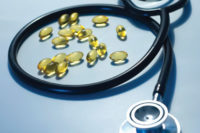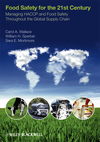Regulators Consider Caffeine
As the hubbub surrounding New York City’s attempt to curtail the sale of supersized beverages appears to have settled, regulators at the highest level have turned their attention to caffeine.

While most of the attention focused on Wrigley’s April introduction of Alert Energy Caffeine Gum, regulators also have noted a host of high-energy foods in the marketplace. New pancake syrups, instant oatmeal, waffles, jelly beans, potato chips, marshmallows and sunflower seeds are among the products promising substantial caffeine additions. Speaking specifically to the Alert product, Food and Drug Administration deputy commissioner Michael Taylor, in a comment on the FDA website, noted, “We believe that some in the food industry are on a dubious, potentially dangerous path. The gum is just one more unfortunate example of the trend to add caffeine to food… One pack of this gum is like having four cups of coffee in your pocket.”
For its part, Wrigley said the product is aimed at adult consumers and “lets people control the amount of caffeine they want on-the-go.” Regardless, Wrigley officials have announced the company will halt U.S. production, sales and marketing of the caffeinated gum.
Although the FDA has no specific caffeine-related regulations in place, at present, the agency has increasingly turned its attention to the ingredient in recent years: in 2010, it moved to block the inclusion of caffeine in alcoholic beverages and, just last year, expressed concern about high-caffeine energy drinks. Taylor, however, contends the agency is particularly worried about caffeine added to foods that children might easily consume and has called on the industry to implement “voluntary restraint” as the FDA examines the issue and “gets the right regulatory boundaries and conditions in place.”
Taylor warns, “The proliferation of these products in the marketplace is very disturbing to us.”
The group regards 400mg of caffeine per day (roughly four or five cups of coffee) as an amount “not generally associated with dangerous, negative effects” for healthy adults. No such guidance exists for children’s caffeine consumption, however, though the American Academy of Pediatrics discourages caffeine and other stimulants entirely for children and adolescents.
A recent Reuters report suggests the FDA is considering a far-reaching re-examination of its rules. Noting it has been more than a half century since the last revision to U.S. regulations governing food additives, the report notes “the number of chemicals in the food supply has risen from fewer than 2,000 to an estimated 10,000, many of which are never reviewed by the FDA because companies and their advisers have declared them to be safe.”
Speaking at the recent Reuters Health Summit, FDA commissioner Margaret Hamburg wondered aloud if the time had come to revisit the guidelines. “It’s perhaps a time to look at what the legal framework looks like and what opportunities there are now to ask and answer questions in new ways because of advances in science and technology.”
The suggestion comes in the midst of Pew Charitable Trusts’ food additives project, a three-year investigation into food additive regulation. It has found 1,000 chemicals self-affirmed as GRAS without notice to the FDA, with another 2,000 declared GRAS by the Flavor and Extracts Manufacturers Association, which submits information to the FDA, though Pew contends the FDA does not review it. In total, the Pew project alleges some 3,000 chemicals in the food supply never reviewed by the FDA.
Caffeine, for instance, has long had GRAS status in cola-type beverages. However, the issue with energy drinks centers around the levels of caffeine present. Soda typically contains 71mg per 12oz.; the same amount of a typical energy drink contains 114mg.
"There is not a clear linkage of exposure to caffeine and the adverse events reported," Hamburg said at the time (allegations had attempted to link caffeine with a variety of health issues, heart troubles and even death among them). She added that the agency would monitor energy drinks and that further examination of the underlying science "may merit action going forward."
Horse Feathers
European regulators are in the midst of their own regulatory rethink in the wake of the horsemeat scandals of recent months, when beef-labeled products were found to contain traces of horsemeat. The European Commission is now proposing all future testing of food be mandatory and conducted without any prior warning.
“The legislation that we are now proposing as [a] Commission is that official controls should always be unannounced in order to strengthen our tools to fight fraud,” explained Tonio Borg, the EU health commissioner.
In April, random tests found less than 5% of the more than 7,000 beef samples inspected contained horsemeat. pf
Looking for a reprint of this article?
From high-res PDFs to custom plaques, order your copy today!





